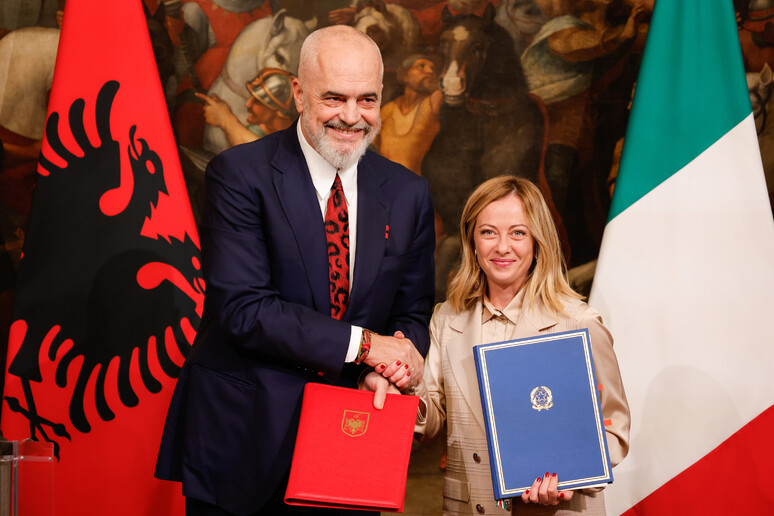The "innovative" migrant agreement the
Italian government signed with Tirana this week is based on the
idea of detaining asylum seekers from so-called safe countries
of origin for the duration of the asylum procedure in order to
facilitate their repatriation in the event of a negative
outcome, in line with provisions introduced in a recent law on
migration, Interior Minister Matteo Piantedosi said on
Wednesday.
"The hypothesis is to create a detention facility for asylum
seekers from safe countries" and it is "the result of
cooperation with a friendly and brotherly country, as the
Albanian premier Rama has said himself," said Piantedosi.
"I understand that innovative things often create discussion,
but you will see that everything will be arranged according to a
logic that we announced some time ago and on which we have been
working. It is part of the overall plan," added the minister
referring to the Cutro migrant law approved by parliament in
May, which introduced the possibility for asylum seekers from
so-called safe countries of origin to be detailed in border
areas for the duration of an accelerated asylum procedure and
with the authorisation of a judge.
One such facility is already operating in Pozzallo.
Piantedosi also confirmed that jurisdiction for the centres in
Albania would be Italian bit without giving details of how this
would be enforced.
"This will be seen in the implementation of the agreement that
was signed in the first place," he said.
Italy currently considers 16 countries or origin to be safe:
Albania, Algeria, Bosnia and Erzegovina, Cape Verde, Ivory
Coast, Gambia, Georgia, Ghana, Kosovo, North Macedonia, Morocco,
Montenegro, Nigeria, Senegal, Serbia and Tunisia.
President of the Italian Bishops' Conference and Bologna
archbishop Cardinal Matteo Zuppi said the agreement to set up
migrant centres in Albania is an admission of inability to
receive them in Italy.
"I have read about it, we'll have to wait and see, per se it is
an admission of inability because it is not understandable why
reception should not be better organised, on this there can be
no doubt," said Zuppi on the sidelines of the presentation of a
report by the Migrantes Foundation.
"It seems there are also discussions within the majority, what
is certainly important is to have a reception system that
provides security to all, both to those who are received and to
those who receive," he added.
Under the agreement Meloni signed with Albanian Premier Edi Rama
in Rome on Monday, migrants rescued at sea by the Italian
authorities would be taken to Albania.
It would not apply to migrants picked up by NGO-run
search-and-rescue ships, those who actually land in Italy or to
minors, pregnant women and vulnerable people either.
At the northwestern Albanian port of Shëngjin, the deal says,
Italy will handle disembarkation and identification procedures
and set up a first reception and screening centre.
In Gjader, also in north-western Albania, it will set up a
another centre for asylum seekers from so-called safe countries
of origin along the lines of the centre at the Sicilian port of
Pozzallo, where people are held for the time necessary to carry
out accelerated asylum determination procedures.
Deputy Premier and Foreign Minister Antonio Tajani, meanwhile,
dismissed assertions that the agreement is unlawful.
"The agreement signed with the Albanian State complies with all
EU laws," Tajani told reporters at the end of a G7 Foreign
Ministers' meeting in Tokyo.
"It is very different to other agreements that have been reached
by other countries.
"It aims to... make sure that people who have not complied with
the rules and do not have the right to enter Italy can be taken
back to their countries of origin."
The European Commission has said it has requested more
information about the details of the agreement.
On Tuesday centre-left opposition Democratic Party (PD) leader
Elly Schlein said that the agreement "seems in open breach of
international and European law".
The Italian section of Amnesty International has said that the
deal was "illegal and unviable.
"People who are rescued at sea by the Italian authorities,
including those seeking refuge in Europe, are under Italian
jurisdiction and cannot be transferred to another State before
their asylum requests and individual situations are examined,"
Amnesty said.
UNHCR refugee body goodwill ambassador and Hollywood actress
Cate Blanchett told the European Parliament that externalising
the migrant issue is inhuman and damaging.
The Italy-Albania deal comes 10 years after Blanchett's native
Australia signed an offshore processing agreement with Papua New
Guinea, rescinded in 2021, and amid British government plans, so
far stymied by the courts, to send asylum seekers to Rwanda.
The Australian Oscar winner told the EP that migrant management
externalisation practices were "ineffective and inhuman
policies" which "have wasted billion of taxpayer dollars" and
which are now "a discredited and largely abandoned approach".
She added: "I ask myself if those who are now calling into
question the Convention on asylum rights have ever met a refugee
or have been forced to face up to the human cost of damaging
policies like externalisation".
ALL RIGHTS RESERVED © Copyright ANSA











